


Hey, did you just wake up with sleep wrinkles or creases all over your face? Did you know that pressing your face against a pillow for a long time can cause that to happen? Even worse, it could end up being permanent if you do it long enough.
In this article, we will take a look at what causes sleep wrinkles and sleep hygiene practices to help you prevent and get rid of sleep wrinkles fast.
Sleep wrinkles, or sleep lines, are lines and creases that develop on the face due to pressure compressing the skin or friction against your skin [1].
When there’s an element of compression or crushing, it causes the skin to break down the collagen in those areas. Collagen is a protein that enhances skin elasticity.
Sleep wrinkles are attributed to a few different factors, one of which is aging. As we age, our skin will naturally start to lose its elasticity and collagen. When this happens, it will lead to more visible sleep lines or sleep wrinkle formation.
Besides age, the way that we sleep can also affect wrinkle formation on our face. According to studies, sleeping on your side or sleeping in a prone position can lead to skin distortion and the formation of skin wrinkles as a result of pressure or stress forces against the skin [2], [3], [4].
Yes, sleeping on your side may produce unwanted sleep lines as your face presses against your pillow or bed surface. Pressure against the skin will cause a breakdown in the skin’s collagen and loss of skin elasticity, resulting in the development of wrinkles.
Sleep wrinkles are simply inevitable. Sooner or later, they appear and become etched into the skin. But you can opt for some changes in lifestyle to keep them in check and maintain green, youthful skin for as long as possible.
So, here are the 6 sleep hygiene practices to get rid of these temporary sleep wrinkles from your face!
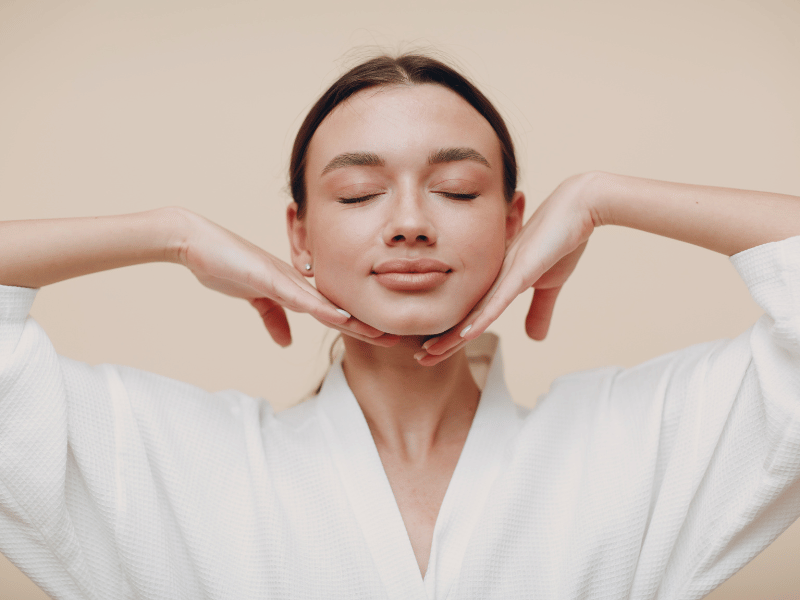
You can get rid of those temporary wrinkles in the morning by massaging your face gently. Massaging your face stimulates blood circulation so that your face looks more refreshed.
You can ensure that the massage is more effective by combining it with an anti-aging cream or a facial regenerating serum [5].
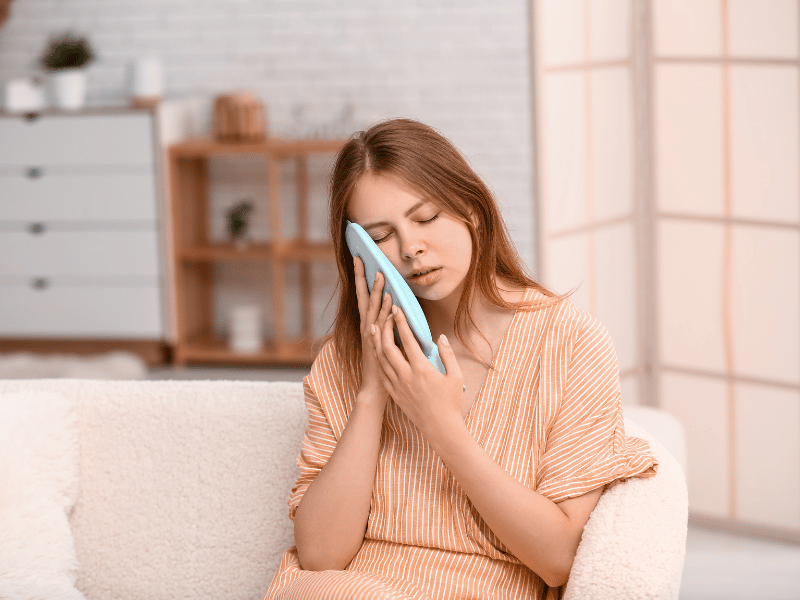
Another way to minimize your facial wrinkles is to apply cold compress or ice to the targeted facial region. Using cold therapy can help to temporarily restrict the blood vessels which helps to get rid of unwanted facial lines.
A study that was conducted found that those who used cold therapy to treat forehead wrinkles had seen significant improvement. This proved cold therapy to be a safe and effective treatment option for reducing wrinkles [6].
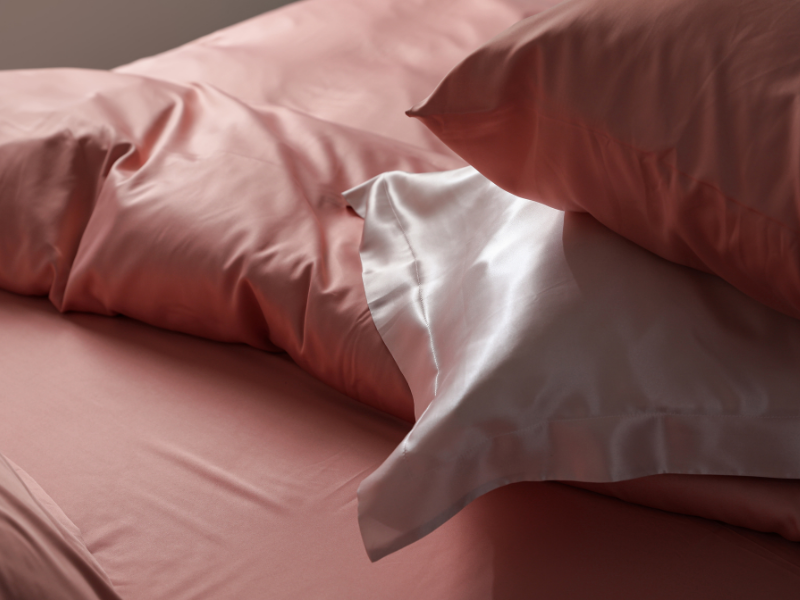
Changing to a silk pillowcase or a satin pillowcase may also be useful in getting rid of wrinkles and preventing wrinkles from forming.
The smoothness of a silk pillowcase can limit the amount of friction that the skin is exposed to while sleeping, preventing sleep wrinkles or sleep creasing from happening at night [7].
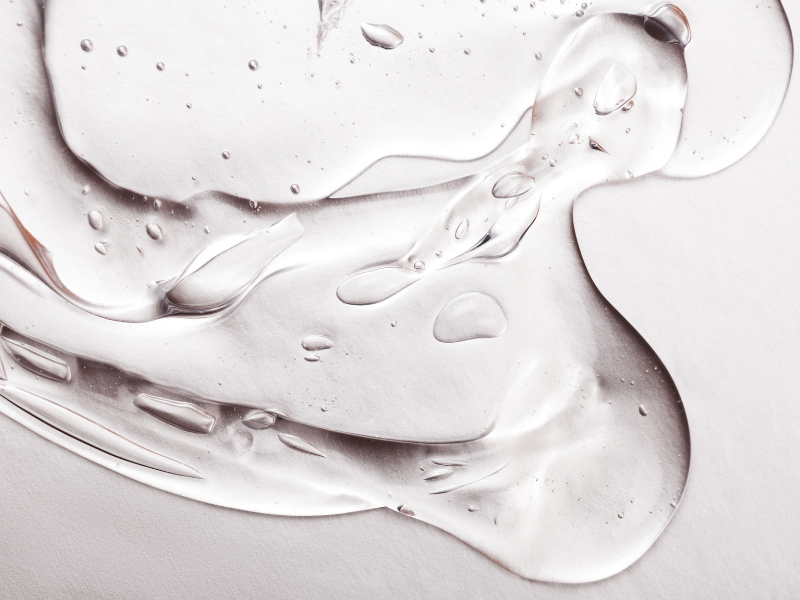
Using retinols or retinoids can also help to reduce the number of fine lines and wrinkles as it increases the production of collagen and new blood vessels formation. Retinols are topical vitamin A that can speed up the turnover of superficial skin cells.
Hence, you can use it if you are looking to reduce your wrinkles. However, it’s important to remember that if you choose to use retinol, you also need to use sunscreen during the daytime as the skin becomes more sensitive upon use of retinol [8].
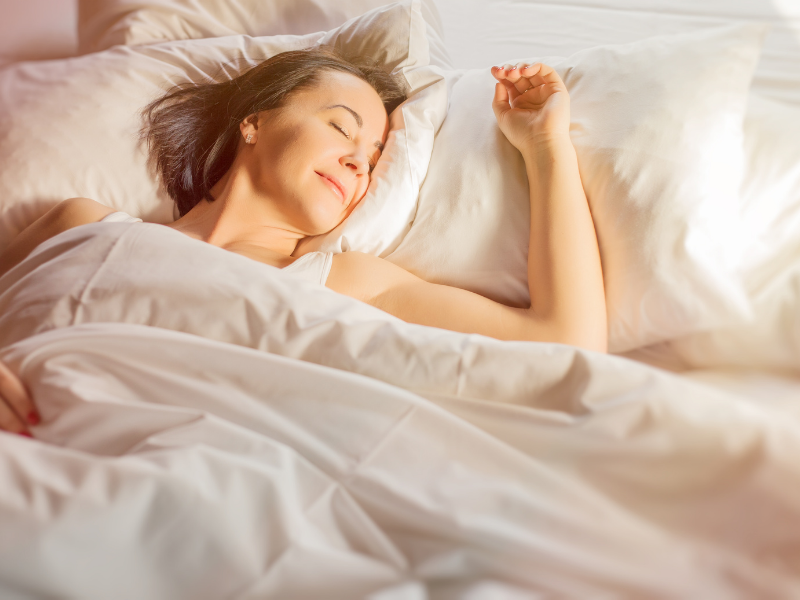
Sleeping on your side and sleeping on your stomach with your face against the pillow can cause you to develop facial wrinkles overnight.
To avoid this, you should sleep in a position where your face is not in contact with any surfaces. This means sleeping on your back so that the pressure is reduced.
According to a study done in 2015, a well-hydrated body is directly linked with a positive effect on skin physiology, assisting in keeping sleep marks and wrinkles at bay [9].
Similarly, drinking lemon balm extract and applying lemon extract on the face helps boost the collagen and elastic fibers of the skin [10].
While sleep cannot completely reverse wrinkle formation, getting good-quality sleep can help to improve your skin’s appearance and slow down the process.
Sleep plays an important role in the growth and repair of multiple physiological systems within our body, one of which is our skin function. One study found that those who tend to get good sleep have a significantly lower intrinsic skin aging score and greater skin barrier recovery compared to those who don’t [11].
Sleep wrinkles usually occur as a result of aging or being in an improper sleep position. Lying with your face against your pillow or on your bed surface for a long time can cause you to wake up with certain facial wrinkles as the pressure disrupts collagen production. However, this can be easily prevented by practicing good sleep hygiene.
Discover more tips to take care of yourself and get better sleep with the ShutEye® app. ShutEye® is an advanced sleep tracking app that analyzes your sleep quality and provides you with personalized insights to help you improve your sleep quality. Try it today FREE for 7 days!
Anson G, Kane MA, Lambros V. Sleep Wrinkles: Facial Aging and Facial Distortion During Sleep. Aesthet Surg J. 2016 Sep;36(8):931-40. doi: 10.1093/asj/sjw074. Epub 2016 Jun 21. PMID: 27329660.
Biotherm (2022) FACIAL MASSAGES FOR WRINKLES [online]. available at: https://int.biotherm.com/en_GB/skin-care-advice/facial-massage-against-wrinkles/AR220704-1.html
Ford, E. (2020) Are Silk Pillowcases Really Better for Your Skin? [online]. Available at: https://www.nytimes.com/wirecutter/blog/are-silk-pillowcases-really-better-for-your-skin/
Harvard Health Publishing (2025) Do retinoids really reduce wrinkles? [online]. Available at: https://www.health.harvard.edu/staying-healthy/do-retinoids-really-reduce-wrinkles
Oyetakin-White, P., Suggs, A., Koo, B., Matsui, M. S., Yarosh, D., Cooper, K. D., and Baron, E. D. (2014) Does poor sleep quality affect skin ageing? Clinical and Experimental Dermatology, 40(1), 17-22 [online]. Available at: https://doi.org/10.1111/ced.12455
Palma, L., Marques, L. T., Bujan, J., and Rodrigues, L. M. (2015) Dietary water affects human skin hydration and biomechanics. Clinical, Cosmetic and Investigational Dermatology, 8, 413 [online]. Available at: https://doi.org/10.2147/CCID.S86822
Palmer FR 3rd, Hsu M, Narurkar V, Munyon T, Day D, Karnik J, Tatsutani K. Safety and effectiveness of focused cold therapy for the treatment of hyperdynamic forehead wrinkles. Dermatol Surg. 2015 Feb;41(2):232-41. doi: 10.1097/DSS.0000000000000155. PMID: 25654195.
Poljsak B, Godic A, Lampe T, Dahmane R. The influence of the sleeping on the formation of facial wrinkles. J Cosmet Laser Ther. 2012 Jun;14(3):133-8. doi: 10.3109/14764172.2012.685563. PMID: 22506801.
Sarifakioğlu N, Terzioğlu A, Ates L, Aslan G. A new phenomenon: "sleep lines" on the face. Scand J Plast Reconstr Surg Hand Surg. 2004;38(4):244-7. doi: 10.1080/02844310410027257. PMID: 15370809.
Stessman, E. (2023) Can your sleeping habits cause wrinkles? Dermatologists say yes, and share how to prevent them [online]. Available at: https://www.today.com/shop/how-prevent-sleep-wrinkles-t286580
Yui S, Fujiwara S, Harada K, Motoike-Hamura M, Sakai M, Matsubara S, Miyazaki K. Beneficial Effects of Lemon Balm Leaf Extract on In Vitro Glycation of Proteins, Arterial Stiffness, and Skin Elasticity in Healthy Adults. J Nutr Sci Vitaminol (Tokyo). 2017;63(1):59-68. doi: 10.3177/jnsv.63.59. PMID: 28367927.